A practical and attractive door allows easy access, protects against the elements, and ensures privacy. When choosing a new door, you have many options, including sliding doors, folding doors, and two popular types of swing doors: hinged doors and pivot doors. Read on to discover which swing door best suits your home.
About the Hinged Doors
What Are Hinged Doors?
Hinged doors are a classic and reliable door design, widely used in homes and buildings.
A door hinge is a mechanical device that connects the door to its frame, allowing it to swing open and closed. Each hinge consists of two plates—one attached to the door frame and the other to the door panel—that pivot around a central pin to enable smooth movement.
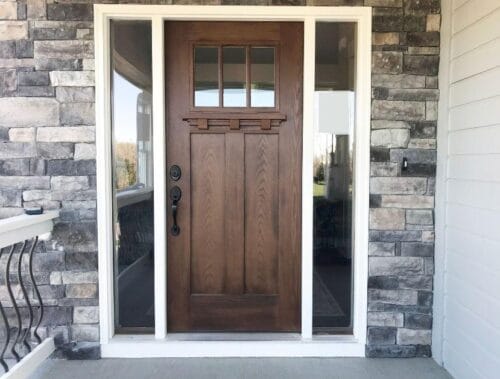
The Perks of Picking a Hinged Door
Let’s be honest, when most people imagine a door, the old-fashioned hinged door immediately comes to mind. It’s the default choice in the door world, and it’s a classic!
Hinged doors are available in a wide variety of styles, including framed, frameless, arched, and custom sizes. They can be designed to open inward or outward, depending on your preference and space requirements.
Hinged doors are generally affordable, widely available, and relatively easy to install with standard tools. Their straightforward design makes them a practical choice for many homeowners.
Any Downsides to Hinged Doors?
No door is perfect, right?
Hinged doors require regular maintenance to remain in good condition. Over time, the top hinges may loosen due to the door’s weight and frequent use, causing the door to sag and potentially drag on the floor.
Additionally, hinged doors require sufficient clearance space to open fully. In small rooms, this can limit furniture placement and affect the overall layout.
And while swing doors are a tried-and-true standby, they might not have quite the same wow factor as a barn door, sliding door, or pocket door. While some doors serve as architectural statements, often a simple, functional hinged door is the best choice.
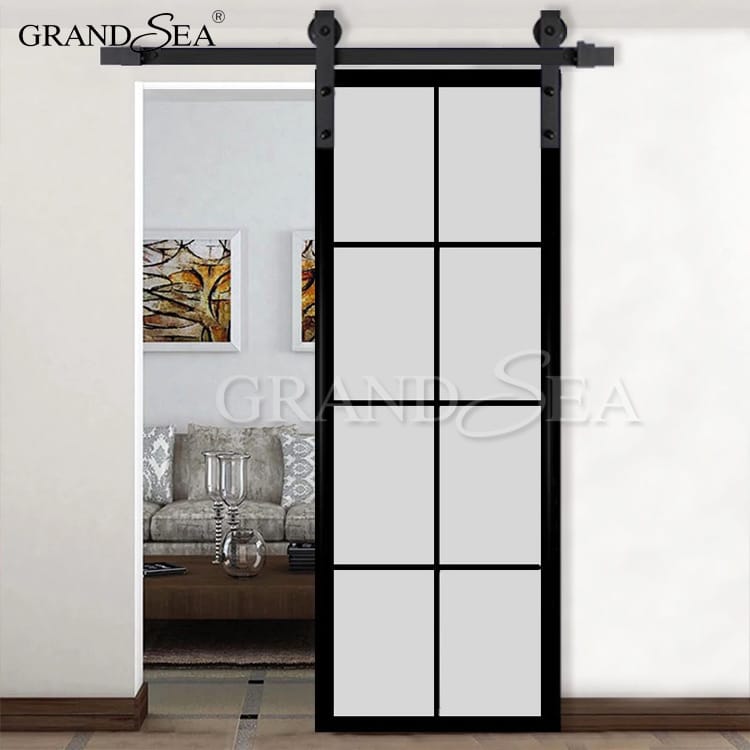
Tips:
Honestly, hinged doors are the standard for a reason – they can be used just about anywhere. Just keep in mind the size and weight of the door and make sure you’ve got the right types of hinges and hardware for the job. They’re a solid choice for pretty much any doorway in your home.
About the Pivot Doors!
What Are Pivot Doors?
A pivot door rotates around a central point or axis rather than traditional side hinges. Unlike hinged doors, pivot doors swing on a single pivot mechanism, allowing for unique movement and design possibilities.

What Makes Pivot Doors Pretty Special?
Pivot doors have become increasingly popular due to their striking appearance and modern design. They serve both functional and aesthetic purposes, creating a bold architectural statement.
Many homeowners choose pivot doors for front entrances or patios because of their sleek design, which creates a seamless transition between indoor and outdoor spaces.
And here’s the kicker—pivot doors can go really big. Unlike regular hinged doors that have size limits, pivot doors can swing wide and proud, giving you those grand, open entrances that feel more like a hotel lobby than a hallway.
Pivot door hardware can often be adjusted to control the speed of opening and closing, ensuring smooth operation. Since pivot doors rotate around a central axis, they do not require traditional side hinges or frames, allowing for more uninterrupted wall space.
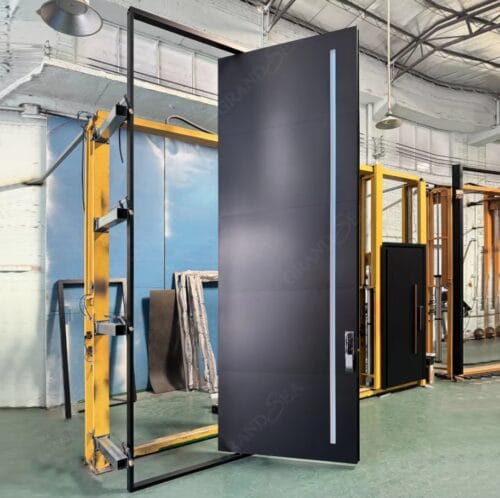
Plus, they can handle hefty materials and impressive sizes thanks to how the weight is distributed vertically. Some even come with features like self-closers and controlled latching.
And because they don’t have exposed hinges, they can be more resistant to forced entry.
What should I pay attention to when buying or installing a pivot door?
Pivot doors have some considerations to keep in mind, particularly warping and cost. Without side hinges, pivot doors rely on central support, which may increase the risk of warping—especially in wooden doors. Additionally, pivot doors tend to be more expensive than traditional hinged doors.
When it comes to price, pivot doors can be quite a bit more expensive – estimates suggest they can cost 30 to 50% more than standard front entry doors.
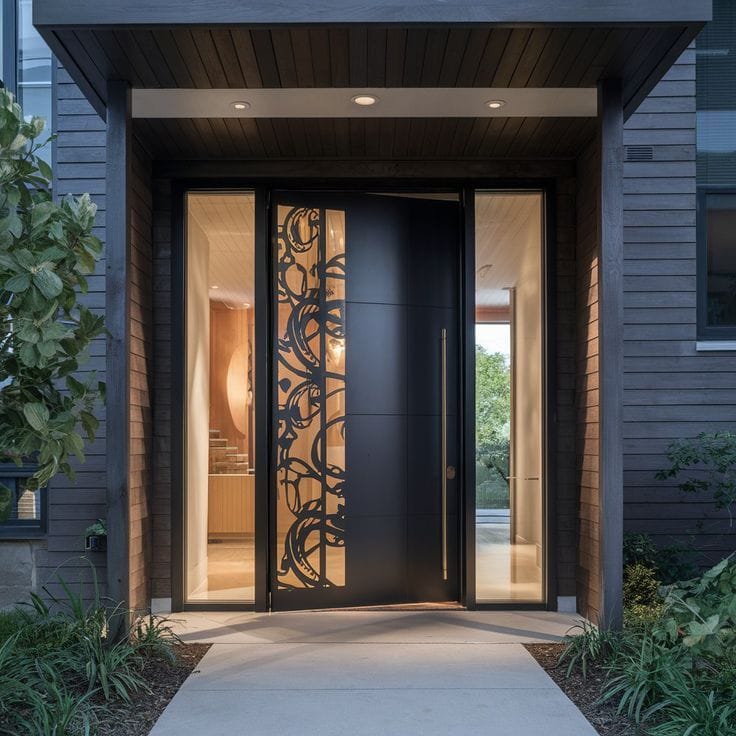
Due to their unique swing mechanism, pivot doors require sufficient clearance on both sides of the doorway. Because the pivot point is offset from the edge, the usable walkthrough space may be slightly reduced compared to hinged doors. Installation is generally more complex and may require specialized expertise.
Where Do Pivot Doors Really Shine?
Not sure which front doors are right for you? Pivot doors make a real statement if you’re looking to wow visitors to your home. They are especially well-suited to modern-style homes. Their capacity to accommodate large sizes makes them an excellent choice for building grand entrances and opening indoor and outdoor spaces.
Pivot vs. Hinged Shower Doors
Pivot shower doors rotate on hinges located at the top and bottom, allowing the door to swing open smoothly. In contrast, hinged shower doors typically have side hinges that enable the door to swing inward or outward.
hinged shower doors can be convenient for corner showers, and they offer the added bonus of being able to open in both directions, which makes cleaning easier.
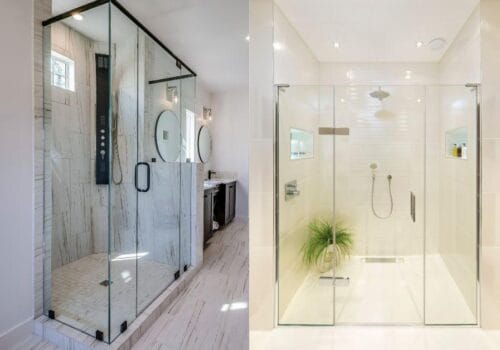
Which Door Should You Choose?
Choosing between hinged doors and pivot doors depends on your style preferences, functional needs, and budget. Hinged doors offer a classic, reliable option that is generally more affordable and versatile. At Grandsea, we provide customized hinged doors tailored to your home’s style and size.
If you prefer a modern, high-end look that makes a bold statement, pivot doors may be the ideal choice. Keep in mind the available space and installation requirements when selecting a pivot door.
Ultimately, the best door is one that meets your specific needs for functionality, design, and cost. If you need assistance, the experts at Grandsea are ready to help you find the perfect door for your home.


